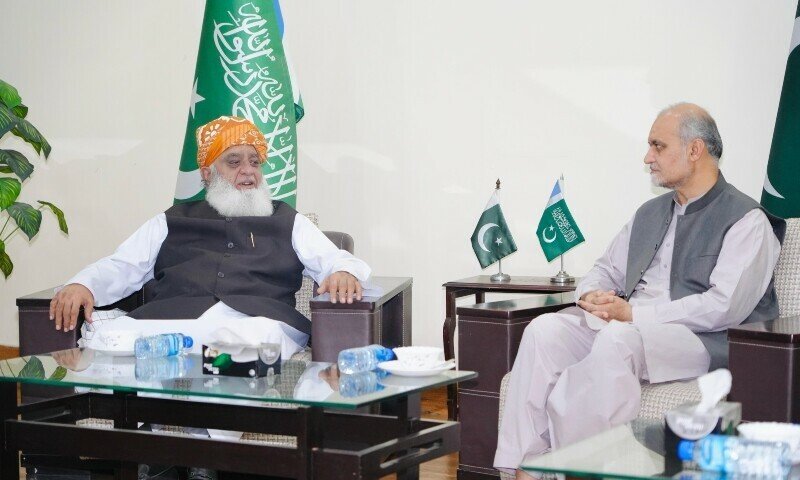Maulana Fazlur Rehman, the leader of Jamiat Ulema-e-Islam-Fazl (JUI-F), has joined hands with the Jamaat-i-Islami (JI) in a united effort to raise awareness about the ongoing humanitarian crisis in Gaza. The alliance was formalized following a meeting at the JI headquarters in Lahore on Monday, where both leaders discussed the escalating situation in Gaza and other national issues of concern.
Joint Press Conference Highlights Solidarity with Gaza
After the meeting, Maulana Fazlur Rehman and JI Emir Hafiz Naeemur Rehman held a joint press conference. The two leaders expressed their deep concerns over Israel’s continued aggression in Gaza and the perceived silence of Muslim world leaders. They also criticized the Organization of Islamic Cooperation (OIC) for its weak stance on the issue, calling for a more proactive and unified response.
Jamaat-i-Islami to Organize Nationwide Strike
During the press briefing, Hafiz Naeemur Rehman announced that Jamaat-i-Islami would be holding a nationwide strike on April 26 in solidarity with the people of Gaza. The strike is part of the party’s ongoing public awareness campaign to highlight the Palestinian cause. Rehman emphasized that political parties in Pakistan should openly denounce both the United States and Israel for their roles in the conflict.
He further reaffirmed Jamaat-i-Islami’s commitment to cooperating with various political and religious parties, including JUI-F, in their common goal for a just cause. However, he made it clear that the JI’s political struggle would remain independent and focused on its own platform.
Maulana Fazlur Rehman Calls for Stronger OIC Action
Maulana Fazlur Rehman shared his views on the ongoing crisis, expressing that the entire Muslim Ummah was deeply disturbed by the situation in Gaza. He emphasized the need for the OIC to take a stronger, more decisive stance in addressing the conflict. The JUI-F leader also revealed that his party had formed a joint platform, Majlis Ittehad-i-Ummat, to foster collective efforts in support of Gaza.
Political Differences and Constitutional Matters
The leaders also discussed domestic political issues, including the controversial 26th Amendment to the Constitution. Maulana Fazlur Rehman acknowledged that political parties might have differing opinions on the amendment, but he stressed that these differences should not be seen as a major divide. He emphasized the importance of ensuring that provincial resources are primarily used to serve the people of the province.
In response to questions from journalists, Hafiz Naeemur Rehman strongly rejected the 26th Constitutional Amendment, arguing that it had weakened the judiciary. He reiterated Jamaat-i-Islami’s longstanding demand for a thorough investigation into electoral rigging, asserting that rather than holding new elections, the country needed to focus on investigating the last polls to ensure electoral transparency.
Commitment to Constitutional Supremacy
Naeemur Rehman also remarked that this was his first meeting with Maulana Fazlur Rehman since becoming the head of Jamaat-i-Islami. Both parties agreed on the critical need to uphold constitutional supremacy, with both leaders emphasizing that all state institutions must operate within their constitutional limits.
Looking Ahead: Continued Engagement Between JUI-F and JI
The meeting marked the beginning of what both leaders have indicated will be an ongoing partnership. While both parties expressed their commitment to a common cause regarding Palestine, they also stressed the importance of maintaining their political autonomy.
Both Maulana Fazlur Rehman and Hafiz Naeemur Rehman agreed that they would continue to engage with each other and explore further opportunities for cooperation on various political and social issues.
The alliance between Maulana Fazlur Rehman’s JUI-F and Hafiz Naeemur Rehman’s Jamaat-i-Islami signals a renewed commitment to the Palestinian cause and a shared desire for stronger political action both domestically and internationally. As the situation in Gaza continues to worsen, both parties are calling on the Muslim world to take a firmer stand, while also addressing critical national concerns, such as constitutional supremacy and electoral transparency.

